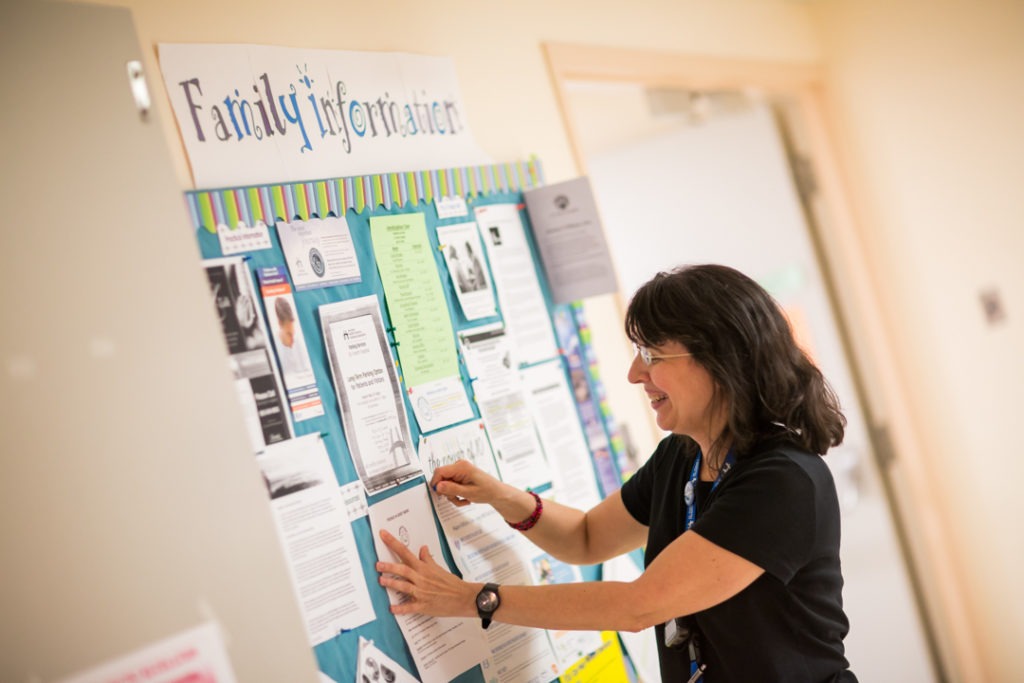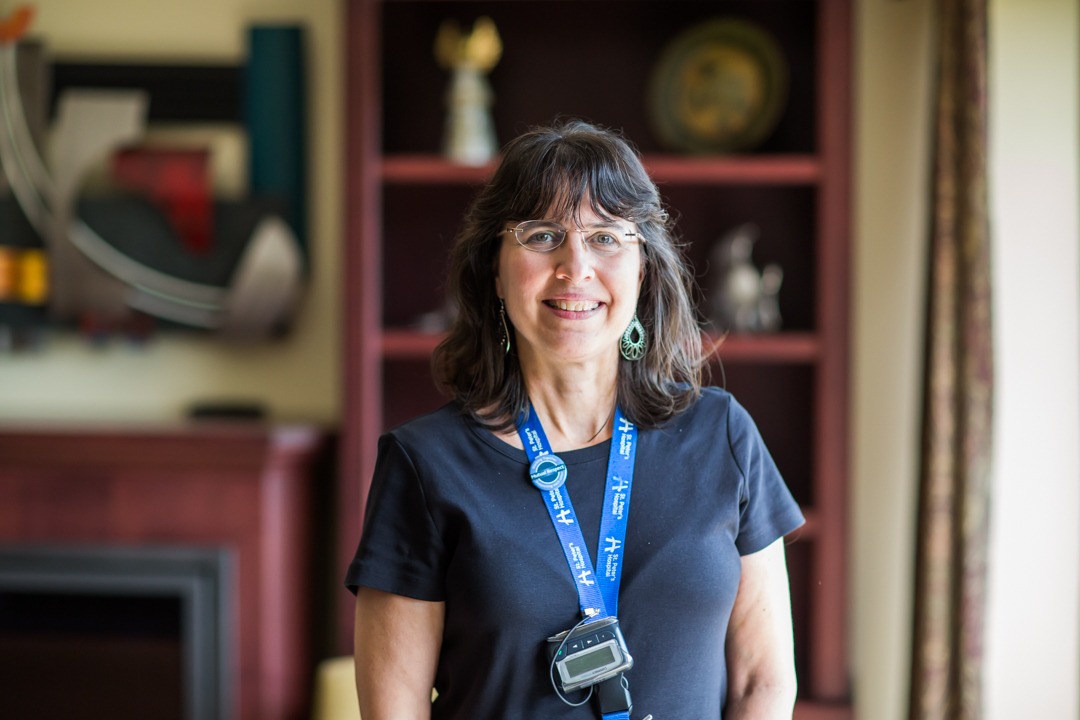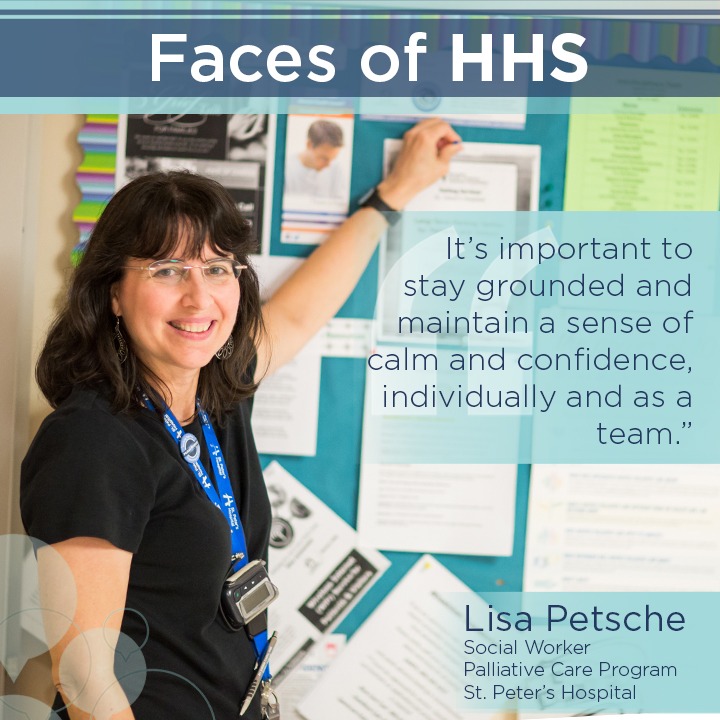
Introducing… a palliative care social worker
Lisa Petsche is a social worker in the palliative care program at St. Peter’s Hospital. She has worked at Hamilton Health Sciences for 26 years.
Favourite colour: bright, bold colours like cobalt blue and emerald green/ vacation spot: by the lake in Long Point or Muskoka, or at my sister’s home in Florida/ music: everything from folk to dance to rock, depending on my mood/ animal: manatees (and my sister’s golden retriever, Sophie)
Tell us about your first day at HHS.
The previous social worker who held the position I was hired for had been gone for three weeks, and there was only crisis coverage in the interim. When I arrived, I was immediately inundated with requests from patients, families and staff to address issues that had been piling up and needed attention. To mix several metaphors, it was a trial by fire: I hit the ground running and flew by the seat of my pants.
Although I was a new grad, it wasn’t enough to scare me off—I’m still here 26 years later! St. Peter’s has changed a fair bit over the years, in terms of the programs that have existed. I’ve worked in virtually all of them at some point, so things have never gotten stale for me.

What do you love most about your job?
It’s hard to pick one thing. Here are several:
I love making a difference in people’s lives, in big and not-so-big ways, from making them smile, listening to their story or giving them permission to cry, to connecting them with a community resource or helping them achieve a goal that’s important to them. I love learning about the person behind the illness and hearing the stories about what has shaped each patient’s life.
I love being part of an interdisciplinary team that appreciates collaboration and comes together to fulfill our patients’ wishes whenever possible.
I love that I’m always learning, including from patients, family members, staff, students and volunteers. It’s energizing, and it keeps me humble (I hope).
I also love working in a smaller setting. Although it’s been part of HHS for a while now, St. Peter’s has retained its intimate feel. It’s rare to walk through the lobby without encountering someone I know or recognize. It’s pretty special. I thrive on it, and so do the patients and families I work with.
“We admit patients 24/7 and things can change quickly, so it’s an ongoing challenge to stay in the loop and ensure you’re where you’re needed most.”
Describe some of your biggest challenges at work.
There are a number of challenges to working in palliative care. We admit patients 24/7 and things can change quickly, so it’s an ongoing challenge to stay in the loop and ensure you’re where you’re needed most.
Because patients are expected to decline and die, their status can change quickly. Some are admitted close to death, so things can get intense and emotions can run high. It’s important to stay grounded and maintain a sense of calm and confidence, individually and as a team, in order to provide the best possible support to patients and families. Some situations are harder to deal with than others, though—like when someone is dying and has young children.
Another challenge is finding time for things on my to-do list, since unexpected needs arise often. It’s hard sometimes not to feel frustrated. It can also be hard to leave work on time when so much is unfinished or a new patient may just be arriving. But I have to draw a line and walk out the door trusting that I’ve done my best under the circumstances.
What do you wish patients/colleagues knew about you?
I’ve been a blood donor since I was a teenager. There’s an ongoing need, and I wish more people would give it a try. My dad was a blood donor and I couldn’t wait till I was old enough to join him. I’m not especially fond of needles, but I would much rather be on the giving end of blood donation than the other end. Health is something I try not to take for granted, and giving blood is a way of expressing gratitude for it.
“Given how the population is aging, more and more people find themselves helping out aging relatives, friends and neighbours, so it’s a topic of increasing relevance.”
What do you do after work to unwind?
I often take a walk before heading to the bus stop (I like that St. Peter’s is in a residential neighbourhood with character homes and tree-lined streets). On the bus ride home, I daydream or discreetly people-watch. If I’m driving, for buffer space I typically do an errand or two instead of going directly home; everyday, mundane things like banking and picking up a few groceries help draw me away from work mode and back into my ”other life”.
When you tell people what you do, how do they usually react?
It’s a conversation killer at parties if I say I work in end-of-life care. Someone either quickly changes the subject or says they can’t imagine how anyone could do that kind of work for any length of time and not get depressed.
On the other hand, I typically get a good response when I mention that one of my special interests is supporting caregivers. Given how the population is aging, more and more people find themselves helping out aging relatives, friends and neighbours, so it’s a topic of increasing relevance.

Tell us about your most gratifying experience at HHS.
I’ve been at HHS for many years so I’ve had lots of incredible experiences. To name a few:
• Co-ordinating discharge to independent living for a patient who was thought to be near death when he was admitted to the Palliative Care Program. His apartment and belongings were long gone, he had no social supports and his finances were limited. Our team pulled together to launch him back into the community with everything he needed and more. I’m very proud of that.
• Organizing a “last wish” family trip to Niagara Falls for a young patient with no income who needed a wheelchair to get around.
• Helping a patient reunite with her estranged son shortly before her death (recalling that one still brings tears to my eyes).
• Helping a patient die in a manner that honoured his unique cultural traditions, in spite of many logistical challenges. In every instance, it takes teamwork to make things happen and ensure all goes smoothly.
What keeps you grounded?
I collect quotations in a journal. These are two favourites that pertain to my work:
“Out of suffering have emerged the strongest souls; the most massive characters are seared with scars”
– Kahlil Gibran (I feel privileged to meet some of these people through my job)
“When you treat a disease, you win or you lose. When you treat a person, you always win, no matter what the outcome.”
– Paraphrased from Dr. Hunter “Patch” Adams.
